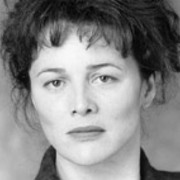
Sarah Peirse
Sarah Peirse began acting in the late 70s. On screen she has made a habit of avoiding formula projects, often working with emerging directors who demonstrate a fresh eye: Vincent Ward on The Navigator, Peter Jackson on Heavenly Creatures, Christine Jeffs on Rain. For Peirse, the result has been an impressive body of awards and nominations.
Sarah Peirse studied drama for a year at a drama school allied to Auckland’s Theatre Corporate. Her classmates included two actors she would work with again, Donogh Rees (Constance) and Phillip Gordon (Inside Straight).
Afterwards Peirse found herself acting on stage in everything from A Bear Called Paddington to Three Sisters. In 1984, after a year in London, she started directing theatre, beginning with Caryl Churchill’s Top Girls at Theatre Corporate.
Peirse’s first dose of screen acting was for a beautifully-lensed portrait of Auckland car culture: 1980 short film Queen Street. Peirse played the pregnant girlfriend, wedged in the front seat between two guys in love with their cars.
She followed it by jumping into the deep end for A Woman of Good Character. Peirse appeared in almost every scene of this immigrant drama, playing a young English servant who travels to New Zealand, and finds herself amongst questionable company on a rundown Canterbury farm. Initiated by producer Grahame McLean, the film was directed, largely on location near Queenstown, by Angel Mine’s David Blyth. Peirse won a Feltex best actress award for her work; she was later called back for reshoots when the 50 minute drama was expanded to tele-feature length (this time under the title It’s Lizzie to those Close).
The 80s saw Peirse alternating theatre with a run of small television roles, and the occasional movie. Among the TV roles, she played mother to one of the childhood heroes of WWII tale The Champion, and enjoyed a guest role as the daughter of a racehorse owner in Inside Straight, a show “about Wellington’s underside”.
She was also award nominated for two features that decade — a small part in Richard Riddiford’s debut feature Arriving Tuesday, and playing “the only woman in a film about men”: Vincent Ward’s acclaimed fantasy The Navigator. Again Peirse showed her gift for accents, this time 14th century Cumbrian. But the Best Supporting Actress award she won for The Navigator was likely also recognition of courage under fire. Peirse’s memories of a “hard but marvellous” shoot include filming in deep snow halfway up the Southern Alps, while heavily pregnant.
Since The Navigator, Peirse has spent extended periods living outside of New Zealand. At the end of 1989, she began two years with the Melbourne Theatre Company, then spent nine years in Sydney, followed by three in the United Kingdom.
While in Australia Peirse was invited home to work on 1994‘s Heavenly Creatures, based on a true-life friendship between two Christchurch-based teenagers which ultimately resulted in matricide. Bowled over by the “magnificent” script by Peter Jackson and Fran Walsh and its portrait of a disintegrating mother-daughter relationship, she signed on to play Pauline Parker’s unfortunate mother Honorah. She also did double duties on set, working as an acting coach to newcomer Melanie Lynskey, who played her screen daughter.
Peirse’s empathetic performance won the 1995 NZ Film Award for Best Supporting Actress, plus a nomination at America’s Chlotrudis awards. Heavenly Creatures made it onto more than 30 ‘best films of the year’ lists. Amidst a rush of rhapsodic reviews, Variety’s David Rooney argued that her portrait of the quietly tragic mother was “terrific”.
The following decade Peirse returned home, having been won over by another memorable script: beachside coming of age tale Rain, based on the novel by Kirsty Gunn. For Peirse, playing the sophisticated, unsatisfied Kate was the type of role she had done on stage, but never on film. Though critical of the character’s lack of parental responsibility, Peirse enjoyed the lack of domesticity. “It was wonderful because most roles for women in their 40s are about serving the needs of others in terms of cups of tea and coffee”.
Rain marked the feature film debut of commercials director Christine Jeffs. The drama won enthusiastic reviews from The NZ Herald (who named it one of the 10 best films of the year), North and South, The Evening Post, New York Times, NY Daily News, and the Los Angeles Times.
Listener reviewer Philip Matthews found Peirse “especially good in the film’s most difficult and unsympathetic role”; New York Newsday’s Jan Stuart argued that she "delivers a gorgeously haunted performance that is no less sympathetic for its subtlety”. Peirse’s performance won her best actress awards in NZ and the Fantasporto Festival in Portugal, plus another American Chlotrudis nomination.
Sarah Peirse continues to act on stage and screen. Her stage career has included leading roles in Cabaret, Three Sisters, A Streetcar Named Desire, and an award-winning turn in Melbourne as Molly Sweeney. Overseas, her roles on television include guest appearances on Australia’s Flying Doctors, Water Rats, and Spirited, and a role as a turn-of-the-century eccentric in 2001 British hit Murder Rooms.
Back home she was nominated for another local television award, for her work in tele-movie Aftershock (as the woman running an emergency management office, after a quake in Wellington). She also appeared in Brendan Donovan's first feature The Hopes and Dreams of Gazza Snell, and played exasperated mother to Katherine Mansfield in 2011 tele-movie Bliss.
Sources include
Sarah Peirse
David Rooney, 'Heavenly Creatures' (Review) - Variety, September 11 1994
Anonymous, 'Rain screens in 40 U.S. cities' - NZ Film, November 2002 (Issue 69, Page 8)
'Sarah Peirse' (Agent's Biography), Robert Bruce website. Accessed 4 February 2012
Rain Press Kit